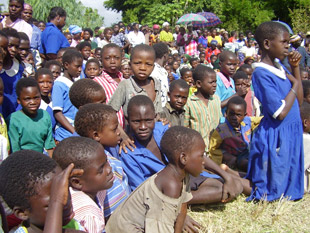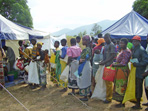In Depth |
|
|
LIVING WITH HIV/AIDS IN MALAWI - UN SPECIAL ENVOY TAKES STOCK
The UN Secretary-General's Special Envoy for Humanitarian Needs in Southern Africa has visited a community support network, a food distribution and a hospital in Malawi, as he takes stock of how the country is coping with the spread of HIV/AIDS. The UN Special Envoy, WFP's Executive Director James Morris, first visited the Village to Village AIDS Community Better Life Organisation supported by Unicef in Zomba District. VILLAGE TO VILLAGE The organisation, which was founded in 1994 to reduce the spread of HIV/AIDS and provide support to people living with AIDS, operates in 120 villages through a network of 780 volunteers. Village to Village provides support to individuals, households and communities, specifically targeting groups including orphans and other vulnerable children, people living with HIV/AIDS and women experiencing property dispossession. CHILD CARE Morris visited one of 12 established community-based child care centres, through which 42 trained caregivers suport 828 children under five years old. Children attend the centres in the morning and receive early learning and stimulation supporting their psychological, physical, emotional and spiritual development. HOME-BASED CARE Morris also met some of the 50 community home-based care volunteers who have been trained and provided with home-based care kits and bicycles. These volunteers provide practical, psychosocial and pastoral support to some 150 chronically ill children and adults in the community, and help address stigma and discrimination by supporting patients' friends and neighbours. PROPERTY DISPOSSESSION Village to Village has trained 10 community-based facilitators on the issue of property dispossession, including legal background, mediation and counselling tools and action planning. These facilitators work with volunteers to target villages for focused community work on the topic, explaining rights under Malawi laws, the advantages of writing a will and guidance on how victims of property dispossession can seek justice and support. MACHINGA DISTRICT Morris went on to visit a project under which WFP and the Joint Emergency Food Aid Programme (JEFAP) provide support to HIV/AIDS affected and infected people in ten districts, including Traditional Authority Mposa in Machinga District. People in this area mostly cultivate rice, since the area is unsuitable for maize farming. They also rely on fishing from the nearby Lake Chriwa. FOOD INSECURITY The 2005 dry spells adversely affected rice farming, leaving almost 80 percent of households food insecure. Coping mechanisms include piece work, the sale of charcoal and firewood and fishing. HIV/AIDS has directly affected 70 percent of households in the area, and it is believed that 60 percent of children are orphans. FOOD AID The food aid provides these households with dietary support and also creates awareness, as information is passed on, enabling members of the household to make informed choices, thereby preventing the further spread of HIV/AIDS. The Special Envoy's mission witnessed a food distribution, watched a theatre group disseminating messages on HIV/AIDS and nutrition, and met orphans, farmers and some of the chronically ill who have received food aid under the project. BOTTOM HOSPITAL Morris also visited the Unicef-supported Bottom Hospital in Lilongwe District, a referral hospital for maternal health. With technical assistance from the University of North Carolina and Unicef, the hospital educates pregnant women in how to avoid passing on HIV/AIDS to their children. SHORTAGE OF NURSES Bottom Hospital is the busiest maternity hospital in Malawi for normal births; complicated deliveries are referred to the Kamuzu Central Hospital. The Special Envoy's mission witnessed the consequences of an acute shortage of nurses, which means one nurse must deliver several mothers simultaneously. |
| |||||||||||||||||||||

 WFP and Emmanuel International are targeting 160 households supporting orphans and 80 taking care of chronically ill people.
WFP and Emmanuel International are targeting 160 households supporting orphans and 80 taking care of chronically ill people.